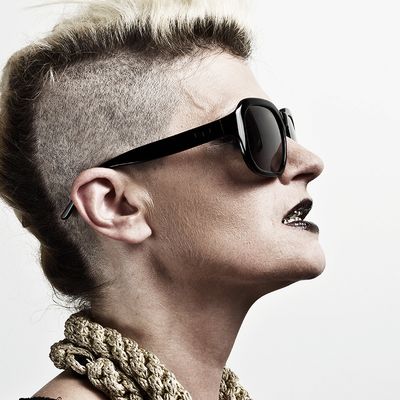
“I get really excited when I see images of hot dogs,” says Peaches, stopped short by a street-food cart out in front of the Whitney Museum and its enticing array of laminated menu illustrations. It is lunchtime, but the gloriously pervy electroclash musician, at 46 still probably best-known for her throbbing anxiety-sex anthem “Fuck the Pain Away” from back in 2000 (“Suckin’ on my titties like you wanted me / Calling me, all the time like Blondie / Check out my Chrissy behind / It’s fine all of the time …”), isn’t buying one to eat; she just has to take a picture with her phone. “No it has nothing to do with it being …”
She’s clarifying, but not embarrassed. (Peaches is not the embarrassable type — to use one recent example, she has a single off her new album, Rub, called “Dick in the Air,” and the video for it has her and her friend Margaret Cho trundling around Los Angeles in knitted mohair onesies appended with realistically knitted mohair penises. Among other things, they have their way with a watermelon with two holes in it.) “Hot dogs were my comfort food as a child …” she says. “You know, when your dad takes you to the fair on, like, Mom’s day off. My mom went back to school when she was 30, and she’d be like, ‘Sundays are my day off, you have to take the kids.’” But Dad didn’t cook much, beyond making scrambled eggs with … salami. “And we were always like, ‘Yay! We get to eat hot dogs!’”
Today, she’s in a cruciform-imprinted semi-transluscent black top, gray Converse high-tops, the laces wrapped around her ankles, and decked out in jewelry that spells out “blessed” and, in fact, “hot dog.” (“I have others, but they got stolen.”) She’s holding a now-cold cup of coffee she’s been nursing since 10 a.m., when she started her day in deep Brooklyn. Now it’s after one, and she’d had a late night, playing a tiny, sweaty, and deliriously methodical invitation-only show at the bar at the McKittrick Hotel — which isn’t actually a hotel but in fact the set for that immersive theatrical diversion Sleep No More — squatting on her soundboard in various states of systematic undress, flipping the various switches required to make her own music, adding and subtracting pieces of wardrobe, including a kind of cape made out of Muppet-y breasts that she took out of a suitcase flopped open onstage with her. It was an almost-vaudevillian one-woman show, delightful, antic, and intense.
And of course she spit Champagne on the fans.
Rub is her first album in six years, and the first one she’s released herself now that she’s left her once-indie label, XL Recordings, which has gone more mainstream than she has managed to. “This great little independent label, and then everything changed when they signed Adele and Beck …” she tells me as, having avoided eating a hot dog, we headed to the Gansevoort Market to buy gluten-free arepas. Since 2009’s I Feel Cream, she’s been busy with her version of Jesus Christ Superstar (called Peaches Christ Superstar), singing opera (in 2012 she played Orphus, the lead in Monteverdi’s epic L’Orfeo, singing in phonetic Italian in Berlin), putting together a photo book (What Else Is in the Teaches of Peaches), and making a film called Peaches Does Herself.
Peaches is busy, and enough of a success to do things her own way, split her time between Berlin and L.A., and count among her friends avant-garde icons like Kim Gordon (who co-stars in one of Rub’s videos, “Close-Up,” as her wresting coach). She’s a pioneering sexual ironist whose be-who-you-are plumage helped make room in the popular culture for the goofball self-empowerment depredations of, say, Lena Dunham or Miley Cyrus.
Peaches was born Merrill Beth Nisker, in Toronto, the youngest of three, and took her theater major to become a music teacher for kids. “I never meant to be a responsible young lady,” she says. “These things just sortof happened. I needed a job, and I got a job in a day-care center, and it was horrible. I started playing the guitar and doing role-play, which is what they do at that age. And the other teachers were like, ‘Are you drugging these kids? Why are they listening to you? Why are they not bored? Why are they not whining?’ I was like, ‘I was speaking their language.’” The kids would always ask her, “’Are you a kid or an adult? And also are you a boy or a girl?’ They had no idea.” Then, at night, she was smoking pot and making music and hanging out with her friends Feist and Chilly Gonzales.
“I made the decision not to move to New York, which is the obvious place from Toronto,” she says as we eat. “But half my family is here, and I spent half my time here. From the old country, half of them moved to Toronto and half to New York. And I was thinking that city is going to swallow me up. I wasn’t planning on moving at all, but then I went to Berlin and — you didn’t even realize it was the time to move there, and then I did. People were doing what they want, so I liked it.” Of course, everyone in Berlin immediately tagged her as a representative from New York’s early ’00s “electroclash” scene, which gave the world Fischerspooner, the Scissor Sisters, and eventually, what became Lady Gaga.
And though she’s close to her parents now, that move was a tough period for them. “Since we’re Jewish.” She breaks into a yenta voice: “What are you singing about? And now you’re moving to Berlin?” Meanwhile, for years, she says, the Canadian press ignored her. “They kill their own, all the time. ‘You’re Canadian? We’re not interested.’”
We walk over to the Whitney since she’d not yet been since it reopened downtown, and she wanted to see the opening survey show, “America Is Hard to See,” before it closed. We only have time to see the fifth floor, which housed the most recent art on display: We gasp appreciatively at the meaty mutilated back depicted in Catherine Opie’s Self-Portrait/Cutting, swoon at Jeff Koons’s vacuums stacked in a vitrine, avoid Charles Ray’s oversize hyperrealistic statue Boy, and stand in wonder at Carroll Dunham’s Large Bather (Quicksand), and talk about her relationship to art history, her place in some sort of subversive indie canon. “I always say I wish I’d had a mentor,” she says, before correcting herself, upon considering it a bit. “But there were some. Like Wendy O. Williams. Or Nina Hagen.” Or even gender-fluid pop musicians like Rough Trade, whose 1981 hit-in-Canada song “High School Confidential” she couldn’t get out of her head.
And Peaches has done that for others. Kids come up to her all the time and tell her how one of her defiant, playful songs helped them survive until they got to a place where they could be who they in fact were. She recently won the Polaris Heritage Prize, which is a kind of Canadian Rock and Roll Hall of Fame, inducted along with Joni Mitchell and Cowboy Junkies. In some ways, she has the peculiar comfort of being ahead of her time, and still at it. Peaches will never be mainstream, exactly, but she helped push the mainstream off-center.
“I don’t put myself in the category of being misunderstood by a younger generation,” she says. “I think I’m more understood by a younger generation. Karen Finley and Lydia Lunch: I don’t want to be that angry. I get it and I respect it. But I want to have humor in it, to be more inclusive. People still see me as angry or in-your-face, but in my mind I’m being more inclusive because I’m having more humor in it.”
And it’s hard to not see her references in, for example, Miley Cyrus’s gender-fluid high jinx of late, among many others. “I’ve been referenced by all those girls gong from girlhood to womanhood, from Avril Lavigne to Britney to Pink to Christina Aguilera,” she says. “And Gaga, too, of course. Kesha used to come to my shows.” They’ve all told her directly how she helped them “be that woman.”
“I’ve never heard from Miley,” though she wishes she had; her influence on the pop star, or at least whoever it is around her who helps her fashion her more transgressive moments, “is obvious, you know.” And she doesn’t want to “sound bitter or anything — because I’m not.” After all, from the Set It Off video, where she sang in front of a line of urinals, sneering in pink Y-fronts, to this year’s collaboration she did with the aerialist Empress Stah for her track off Rub ”Light in Places” (it involved a butt plug with lasers shooting out of it), she’s always put out a pretty rigorous social critique you can also dance to.
She’s standing looking out over the city in front of the Glenn Ligon Negro Sunshine sculpture, contemplating this oddball-kid legacy while checking her iPhone. “I think sometimes, when I played four years ago, they used to say, ‘Is she trying to be Lady Gaga?’” She pauses. “And now I sometimes think they say, ‘Why is that old lady trying to be Miley Cyrus?’” she says, laughing. It’s fun to know what you did was compelling — made a difference — even if its sometimes strange to see it refracted, then reflected back on you as a reference.
If anything, she’s jealous of Cyrus having the budget to be able to ride a big, blow-up hot dog when playing live. “If I could do anything in the world, I would fly across the stage on a hot dog! Ahh!”
Peaches plays Irving Plaza October 24.


